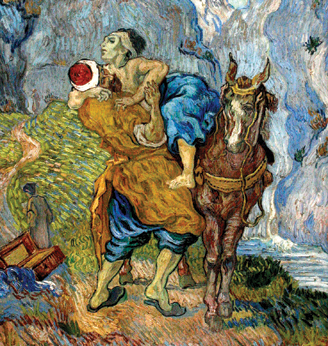
Look at those autumn leaves. What a beautiful time of the year!” These are comments we often hear as we move through the fall season.
The season itself forges a renewed energy. With this freshness of spirit comes the anticipation of new relationships within our communities and ultimately a renewed relationship with God.
Our covenantal relationship has far-reaching implications. It is not solely about us and God, as vital as that connection is. Covenant is also about widening our relationship with others, reaching out to the world around us, addressing issues of social justice and caring for the marginalized of society.
The account of the Good Samaritan (Luke 10:25-37) as paraphrased by Eugene Peterson in
The Message subtitles the passage Defining “Neighbour.” In it, a religious scholar asks Jesus the burning question of the ages: “Teacher, what do I need to do to get eternal life?”
Jesus responds with a question: “What’s written in God’s Law? How do you interpret it?”
The man appropriately quotes from Deuteronomy and Leviticus: “That you love the Lord your God with all your passion and prayer and muscle and intelligence—and that you love your neighbour as well as you do yourself.”
Jesus commends the man for his correct answer, but the scholar inquires further. Looking for a loophole, he asks, “And just how would you define ‘neighbour?’ ” Jesus responds with the poignant parable of the Good Samaritan.

In the story, Jesus tells of a man who is assaulted and left naked by the side of the road to die. The story is told in such vivid detail that biblical scholars have long conjectured that Jesus himself was the man beaten and robbed on the steep, dangerous road from Jerusalem to Jericho. Religious leaders who are too busy, too caught up in their daily lives, pass him by. They don’t want to get dirty and no doubt feel a little above having to deal with these wretched members of society. It is only a reviled Samaritan who stops and gives compassionate care to the stranger. “Which of the three,” Jesus questions, “became a neighbour to the man attacked by robbers?”
The expert in the law replies, “The one who treated him kindly.”
Jesus told him, “Go and do the same.”
God desires that we not only be in relationship with him, but also with those around us. He wants us to engage, impact and influence all with whom we come in contact. It is out of loyalty to Jesus—flowing from our covenant relationship with him—that we must share our hearts and lives with a suffering world.
We can, and we must, make a difference in the life of each person we meet, remembering that every person to whom we show kindness is our neighbour. Jesus said, “Truly I tell you, whatever you did for one of the least of these brothers and sisters of mine, you did for me” (Matthew 25:40).
St. Augustine avowed, with perhaps a wry smile, “Love God, then do as you please.” You see, if we truly love God with all our heart, soul, strength and mind, we will love our neighbours as ourselves. It is divine cause and effect.
The covenant we make with God, and he with us, is foundational. We, in turn, pledge to do all possible, through God’s strength and grace, to reach out in love to others. This is possible because Christ alone is our guide and our daily strength. He is our Solid Rock:
His oath, his covenant and blood,
Support me in the ’whelming flood;
When all around my soul gives way,
He then is all my hope and stay.
(SASB 745)
Jesus’ parting word to the religious scholar remains his admonition to his 21st-century followers: “Go and do the same” (Luke 10:37
The Message).